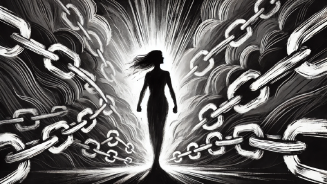Everything You Need to Know About The Vindictive Narcissist

Have you ever encountered someone who seemed determined to make life difficult for everyone around them?
I have.
It was a colleague who would go out of their way to assert dominance and make sure they were in control.
At first, it seemed like standard office politics, but soon it became clear it was something much deeper:
A vindictive narcissism.
Dominance and Control
For vindictive narcissists, control isn’t just desirable—it’s essential. They believe that their way is the only way and that they are uniquely qualified to lead.
In every social or work setting, they aim to be the one in charge. Subordinates are not just expected to follow orders but to do so without question. This rigid expectation often creates a toxic environment where creativity and independent thought are stifled. 🙅♂️
You might wonder why they need to dominate so intensely. The answer lies in their perception of others. To a vindictive narcissist, others are inherently weak and incapable. This belief justifies their need to dominate, as they see themselves as the only ones capable of making the right decisions. They think that because they are in control, everything will run smoothly. However, this couldn’t be further from the truth.
In reality, their need for dominance often leads to conflict and resentment. People don’t like being controlled or undervalued. It creates a workplace or social setting filled with tension. Employees may feel undervalued and demoralized, leading to decreased productivity and a toxic atmosphere.
Friends and family may distance themselves, leading to isolation for the narcissist.
Yet, despite these negative outcomes, the vindictive narcissist remains blind to the harm they cause, convinced that their control is necessary and beneficial.
I’ve seen firsthand how a vindictive narcissist can manipulate their way into leadership positions. They often present themselves as confident and capable, which can be attractive in a leader. But once they secure a position of power, their true nature emerges.
The need to dominate overshadows any initial competence they might have shown. Instead of leading with wisdom and empathy, they rule with an iron fist, expecting absolute obedience.
Power Fantasies
Vindictive narcissists are deeply enamored with power.
They don’t just desire it—they fantasize about it. These fantasies are not grounded in reality but are elaborate constructs of their imagination where they see themselves as all-powerful and unstoppable. This obsession can make them extremely dangerous, especially when they attain positions of legitimate authority.
They dream about success in exaggerated terms, often beyond what is realistically achievable. This constant fantasizing about power and success is one of the hallmark traits of a vindictive narcissist.
Their daydreams are filled with scenarios where they are in control, admired by all, and free from any form of criticism or challenge.
These fantasies fuel their behavior and justify their actions, no matter how harmful.
When vindictive narcissists gain power, they become even more perilous. They use their position to assert dominance and control over others, often leading to toxic environments. They don’t just want to lead—they want to rule.
They seek out positions where they can exert maximum influence and control. Once in power, they target those they perceive as weaker or as obstacles to their grand plans. They pick on subordinates, belittle colleagues, and undermine peers, all to reinforce their sense of superiority.
The vindictive narcissist’s love for power isn’t just about personal gain; it’s about proving their worth to themselves and others. They believe that their success and power are evidence of their inherent superiority.
This need for validation drives them to seek out positions where they can exercise control and demonstrate their perceived superiority. But this quest for power is not without its pitfalls. In their pursuit of power, they often overlook the long-term consequences of their actions, leading to their eventual downfall.
Poor Manipulation Skills
Unlike skilled manipulators, vindictive narcissists often fail to effectively deceive others. Their attempts at manipulation, particularly through gaslighting, are typically transparent.
Gaslighting involves trying to convince you that your perceptions or memories are wrong, but vindictive narcissists are usually so overt in their efforts that you can see right through them.
The lack of finesse in their manipulation attempts stems from their inherent traits. They are driven more by their emotions and need for control than by a strategic, calculated approach. This emotional drive often leads to clumsy and transparent attempts at manipulation, which can quickly be spotted by those around them.
For example, imagine a scenario where a vindictive narcissist is trying to make you feel like you’re the problem in a conflict. They might say things like, “You’re just too sensitive” or “You’re remembering it wrong.”
But their delivery is often so heavy-handed and lacking in subtlety that you immediately recognize what they’re trying to do. Their inability to convincingly gaslight or manipulate effectively becomes apparent.
This poor manipulation skill can be both a blessing and a curse. On the one hand, it means that you can often see through their attempts and protect yourself from their influence. On the other hand, it can also lead to frustration and tension, as their constant, albeit ineffective, attempts to manipulate can wear you down over time.
It’s important to remember that while their manipulation skills are lacking, the impact of their behavior can still be significant. Even if they’re not fooling anyone, the constant attempts to control and undermine can create a toxic atmosphere.
They may not be able to convince you that you’re the problem, but their relentless efforts can still create stress and anxiety.
Vindictive Narcissists Have Intense Feelings Of Revenge
When they feel insulted, even slightly, their minds spiral into a frenzy of retribution. It’s not just a passing anger; it’s a deep-seated need to get even. This need for revenge is often triggered by past insults or rejections, something they can never seem to move past.
You might think that a small, offhand comment wouldn’t mean much. But to a vindictive narcissist, it’s a blow to their fragile ego.
Criticism, no matter how constructive or gently delivered, is intolerable. They perceive it as an attack on their very being. This inability to accept criticism means they can never truly grow or learn from their experiences.
Imagine this: you gently suggest a different approach at work, thinking you’re helping. Instead, your colleague takes it as a personal attack. They stew over it, plotting ways to undermine you. This is their revenge mechanism kicking in.
Their revenge plots are often simplistic and childish. They’re driven by pure emotion, not strategy. It’s like dealing with a schoolyard bully, motivated by resentment and jealousy. They feel justified in their need for revenge, believing others have no right to insult or doubt them.
Oh! And also, narcissistic rage. When they begin to act on their need for revenge, it’s not about teaching a lesson or creating positive change. It’s about making the other person suffer. Their need for revenge can even outweigh their need for self-preservation.
They are willing to destroy themselves just to get back at someone.
This obsession with revenge is exhausting for everyone involved. For you, it means constantly walking on eggshells, trying to avoid triggering their wrath. It’s a never-ending cycle of tension and stress. The vindictive narcissist’s behavior creates a toxic environment where everyone is on edge.
Criticism Intolerance
Vindictive narcissists have an almost allergic reaction to criticism.
No matter how logical, accurate, or gently delivered, they simply cannot accept it. To them, criticism is not just feedback—it’s a direct attack on their self-worth. This intolerance creates a barrier to personal growth and development.
Imagine trying to give constructive feedback to improve a project. Instead of appreciating your input, a vindictive narcissist will see it as a personal affront.
They might react defensively, deny any wrongdoing, or even retaliate against you. It’s not just about protecting their ego; it’s about maintaining their image of perfection.
This inability to accept criticism means they rarely, if ever, learn from their mistakes. They are trapped in a cycle of denial and blame, making it nearly impossible for them to grow. Their defensive nature creates a toxic environment where open communication is stifled. You might find yourself avoiding giving feedback altogether, just to keep the peace.
The result? A work or social environment where problems go unaddressed, and resentment builds. It’s exhausting to tiptoe around someone’s fragile ego, especially when it hinders progress and collaboration.
Childlike Revenge Plans
Vindictive narcissists plot revenge like a child might, with plans that are more about immediate satisfaction than long-term outcomes. These plans are motivated by resentment and jealousy. They’re simplistic, often petty, and lack the sophistication of a well-thought-out strategy.
For example, a vindictive narcissist might try to undermine you by spreading false rumors. The goal isn’t to solve a problem or teach a lesson; it’s to make you suffer. They believe that because they felt hurt, you must feel hurt too. This childlike approach to revenge is often ineffective but can still cause significant distress.
Why are their plans so simplistic?
Because they’re driven by raw emotion. Anger, jealousy, and a desire for immediate retribution cloud their judgment. They don’t think through the consequences or the long-term impact of their actions.
This impulsivity is part of what makes dealing with them so challenging.
Obsession with Revenge
For a vindictive narcissist, revenge isn’t just a passing thought; it’s a consuming obsession. They ruminate over perceived slights, replaying the events in their minds and allowing their anger to fester.
This obsession can be likened to an addiction, where the need for revenge occupies a significant portion of their thoughts and energy.
The vindictive narcissist’s obsession with revenge often leads them to focus intensely on their target. They might spend hours devising ways to “get even,” even if their plans are unsophisticated or childish. This relentless focus can be incredibly stressful for their targets, who may feel like they’re constantly under attack.
Much like an addict getting their fix, the vindictive narcissist experiences a sense of relief and gratification when they believe they’ve successfully exacted revenge. However, this satisfaction is usually short-lived, leading them to repeat the cycle again and again.
Perceived Victimhood
Vindictive narcissists see themselves as perpetual victims.
They believe that any criticism or slight is an unjust attack, and their need for revenge is a way of setting things right. This perceived victimhood fuels their actions, making them feel justified in seeking revenge.
To them, revenge is not just warranted—it’s deserved. They think that anyone in their position would feel the same way and take similar actions. This mindset can be incredibly frustrating to deal with, as they are often blind to their own faults and the harm they cause others.
Imagine someone who constantly feels persecuted and wronged. They believe that by getting revenge, they are restoring balance and justice. This belief in their own victimhood makes them incredibly stubborn and resistant to change. They are convinced that they are right and that their actions are justified.
Insulting Other Narcissists
Vindictive narcissists often find themselves at odds with others who share their traits, leading to some of the most intense and prolonged conflicts.
Vindictive narcissists are not just challenging to others—they’re challenging to each other.
When two vindictive narcissists cross paths, their interactions can escalate quickly. Each believes they are the ultimate victim and that their revenge is justified. This mutual sense of righteousness creates a vicious cycle of retaliation.
These conflicts are often marked by an irrational commitment to revenge. Every slight, real or perceived, demands retribution. Neither party is willing to back down or compromise.
They both believe that they are right and that the other person must be taught a lesson.
This can lead to a never-ending feud, where each act of vengeance is met with an even stronger response.
So, picture this, you have two people locked in a battle where every insult or slight is met with escalating retaliation. Neither side is willing to cut their losses and walk away. This type of conflict can easily spiral into a physical altercation or other forms of serious harm.
The vindictive narcissists’ inability to let go and their need to always come out on top can make these feuds particularly dangerous.
Long-Term Suffering
Vindictive narcissists can be successful in the short run. They might achieve their goals through sheer force of will and manipulation. However, this success is often fleeting.
Their toxic behavior eventually catches up with them, leading to their downfall.
The problem is that they don’t learn from their mistakes. They repeat the same behaviors over and over, expecting different results. This lack of learning and self-awareness means that their success is unsustainable.
Eventually, people catch on to their tactics, and their true nature is revealed.
For those around them, the long-term suffering can be immense. Colleagues, friends, and family members may initially be drawn to their charisma and confidence. But over time, the constant manipulation, need for control, and vindictive behavior become too much to bear.
Relationships are strained, trust is broken, and the narcissist is left isolated.
Dealing with Vindictive Narcissists
Vindictive narcissists are notoriously difficult to deal with. Their need for revenge, intolerance to criticism, and simplistic revenge plans create a toxic environment. Yet, understanding their behavior is the first step in managing your interactions with them.
Here are some concrete strategies to help you cope:
- Avoidance: Sometimes, the best option is to avoid them altogether. If possible, limit your interactions and keep your distance. This can help you avoid unnecessary stress and conflict.
- Standing Up: If avoidance isn’t possible, standing up to them can sometimes shock them into backing down. Like a schoolyard bully, they are often surprised by resistance. However, this approach requires confidence and the ability to handle potential backlash.
- Reasoning: Trying to reason with them can be difficult due to their lack of insight. However, framing your arguments in terms of mutual benefits and using “we” statements can sometimes make them more receptive.
- Documentation: Keep detailed records of interactions and incidents. This can be invaluable if you need to involve higher authorities or seek legal advice. Having a clear, documented history of their behavior can provide crucial support.
- Seeking Support: Don’t try to handle everything on your own. Talk to trusted colleagues, friends, or a mental health professional. Having a support network can provide you with the emotional strength and practical advice needed to cope.
- Setting Boundaries: Clearly define what behavior is unacceptable and communicate these boundaries firmly. Let them know that their actions have consequences and that you will enforce these boundaries consistently.
Conclusion
Dealing with vindictive narcissists can feel like navigating a minefield. Their relentless need for control, revenge, and inability to handle criticism create a toxic environment.
But don’t let their behavior define your experience.
They may think they’re the stars of their own dramatic show, but you’re the director of your life. Keep the spotlight on your well-being and let their antics fade to the background. 🌟
Thank you very much for reading my article.







